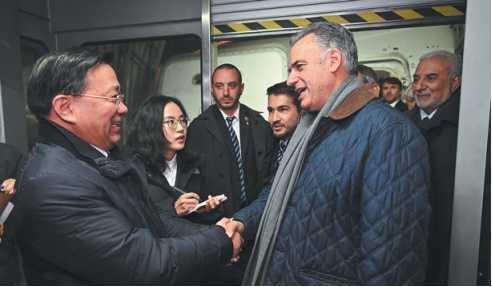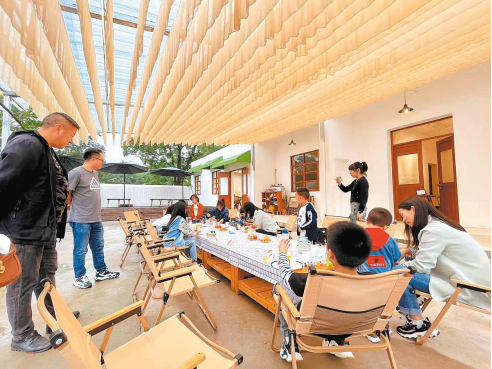Editor’s Note: While President Barack Obama’s executive action last night will bring deportation relief to millions of undocumented immigrants, deportation remains a concern for thousands of children who entered the U.S. illegally. Lauren Markham addresses the question of how to best educate students undergoing the legal process.
“I didn’t want to come here, but I had no other choice,” Ricardo told me earlier this fall.
 Ricardo, a tenth grade student at Oakland International High School, left his home country of Guatemala last spring, making his way up through Mexico and crossing into the Arizona desert. His father left when he was a baby in Guatemala and a few years later, his mother passed away. He had lived with his grandparents for several years, but in 2013, they died too.
Ricardo, a tenth grade student at Oakland International High School, left his home country of Guatemala last spring, making his way up through Mexico and crossing into the Arizona desert. His father left when he was a baby in Guatemala and a few years later, his mother passed away. He had lived with his grandparents for several years, but in 2013, they died too.
Gang violence had increased in his hometown and because he was an orphan, he was an easy target for gang recruitment. So he left. There was nothing to go back to, he thought as he walked through the desert in Arizona. But after he got separated from his group, he spotted a border patrol car and turned himself in.
After four months and three different detention shelters in Arizona and Texas, Ricardo arrived in Oakland to temporarily live with a sponsor — a friend of a friend of the family — while he waited for his day in court. Meanwhile, he enrolled at Oakland International High School, a public school for recently-arrived immigrants, where I coordinate non-academic services and partnerships for our students and families.
Naturally, students like Ricardo and the 94 other unaccompanied minors in my school have a hard time concentrating in class. There are the effects of the trauma they’ve almost all experienced impacting their ability to focus, remember and synthesize information.
There’s also the very real preoccupation with their legal case. Unaccompanied minors all have upcoming immigration court dates; if they cannot prove that they have legal grounds to stay, they will be sent home. It’s nearly impossible to apply for any kind of immigration status without a lawyer, but lawyers are expensive and hard to come by. For students like Ricardo who face the possibility of deportation back to serious danger, it’s hard to focus on algebra or biology — on anything, really, besides their upcoming court date.
But school is critical to their future. School provides a safe, structured and supportive environment for these youth who have experienced so much instability, and they need to learn English to survive and thrive here should they be granted permission to stay. Moreover, judges tend to look favorably on children who are attending school, and are often more likely to grant asylum or special immigrant juvenile status to youth who show a commitment to becoming positive, educated, engaged residents of the United States.
So how can we keep unaccompanied youth in school?
I think we need to focus on supporting their non-academic needs. At Oakland International High School, this has meant building partnerships with legal organizations and private attorneys to setup legal clinics and intakes for our students. Local legal agencies Legal Services for Children, Centro Legal de la Raza and East Bay Sanctuary Covenant have teamed up to provide mass screening and intake days at our school. During the school day, teams of attorneys flock to our school to meet individually with students and see for what kind of relief they might qualify. More than 45 students have received lawyers this fall alone, and thus have a shot at winning their case to stay.
But legal needs are just the tip of the iceberg for students like Ricardo. We connected him with counseling services at our school so he has a trusted adult in which to confide, and our social work intern checks in with him each week to make sure his basic needs — food, clothing, shelter — are being taken care of. He joined our school’s soccer team, run by Soccer Without Borders, and now has a family of friends and positive activities in which to engage during the weekend.
But OIHS is just one of many schools nationwide grappling with how to best support the high needs of unaccompanied minors. If we really want students like Ricardo to succeed in life and in school, we need to ensure that they are connected to the services they need and deserve.
Lauren Markham is the community school manager at Oakland International High School in Oakland, California.
Popular News




Current News
Manufacturing

Collaboratively administrate empowered markets via plug-and-play networks. Dynamically procrastinate B2C users after installed base benefits. Dramatically visualize customer directed convergence without
Collaboratively administrate empowered markets via plug-and-play networks. Dynamically procrastinate B2C users after installed base benefits. Dramatically visualize customer directed convergence without revolutionary ROI.





About Us
Tech Photos























